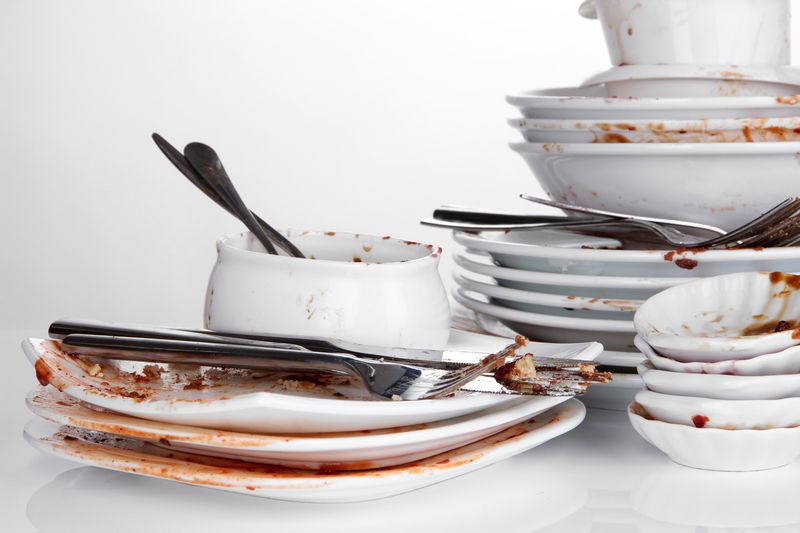Get Ahead in Cleaning with Proactive Measures
Posted on 27/09/2025
Get Ahead in Cleaning with Proactive Measures: A Comprehensive Guide
Cleaning is not just a routine--it's an essential aspect for the well-being, productivity, and longevity of any space. With modern lifestyles becoming increasingly hectic, traditional reactive approaches to cleanliness invite more stress, higher costs, and less effective outcomes. This is why it's vital to get ahead in cleaning with proactive measures. In this in-depth article, we explore proactive cleaning strategies, provide actionable tips, and explain the far-reaching benefits of staying ahead of the mess.

Understanding Proactive Cleaning: What Does It Mean?
Proactive cleaning refers to the practice of anticipating dirt, mess, and potential problems before they arise, and taking steps to mitigate them. Unlike reactive cleaning--where you only clean when there's visible dirt or a mess--proactive cleaning is all about establishing routines, habits, and systems that keep your space clean effortlessly.
- Reduces long-term cleaning time: By dealing with small messes consistently, you prevent larger, time-consuming cleanups.
- Improves health: Proactive measures limit allergen and germ buildup, protecting your health.
- Boosts productivity: Clean, organized spaces lead to clearer thoughts and improved efficiency.
- Saves money: Regular maintenance avoids costly deep-cleans, repairs, or replacements.
Why Choose Proactive Over Reactive Cleaning?
When people act reactively, they clean after the dirt has accumulated or when someone points it out. This can lead to:
- More intense cleaning sessions
- Higher risk of stains and permanent damage
- Spread of germs and allergens
- Embarrassment when unexpected visitors arrive
On the other hand, those who get ahead in cleaning with proactive measures enjoy smoother maintenance and less stress. Would you rather spend 10 minutes a day cleaning, or several hours scrubbing during a major mess?
Top Proactive Cleaning Strategies to Stay Ahead
There are myriad techniques to stay ahead of dirt, grime, and clutter. Here's a comprehensive list of best practices, segmented by environment, to help you stay proactive in cleaning.
1. The Home Environment
- Establish Daily Cleaning Touchpoints: Clean high-traffic areas like kitchens, bathrooms, and living rooms every day, even if it's as simple as wiping surfaces and picking up clutter.
- Use Doormats and Shoe Racks: Trap dirt at entryways. Enforce a no-shoes policy to minimize dirt tracked inside.
- Declutter Frequently: Less clutter means less surface area for dust and germs.
- Rotate Deep Cleaning Tasks: Assign specific rooms or chores to different days or weeks, so nothing is ever neglected.
- Maintain Cleaning Supplies: Keep cleaning materials handy and organized--having them visible encourages regular use.
2. The Workplace Environment
- Create a Cleaning Schedule: Assign personnel or teams to specific duties daily or weekly.
- Enforce Desk Policies: Employees should clear their own workspaces at day's end.
- Disinfect Shared Equipment: Wipe down items like phones, printers, and keyboards regularly.
- Utilize Professional Cleaning: Schedule periodic expert cleanings for areas that require deep sanitation.
3. Hospitality and Healthcare Facilities
- Invest in Staff Training: Teach the importance and method of proactive cleaning to reduce outbreaks and improve guest/patient experience.
- Deploy Zone Cleaning: Assign staff specific areas with checklists for accountability and thoroughness.
- Regularly Audit Cleanliness: Supervisors should inspect and document cleanliness levels regularly.
- Leverage Technology: Use UV sanitizers and high-efficiency cleaning tools for maximum effectiveness.
How to Build Proactive Cleaning Habits
The greatest challenge in getting ahead in cleaning with proactive measures is consistency. Here's how to cultivate lasting habits:
- Visual Reminders: Place notes in strategic locations to reinforce routines (like "Wipe the counter after use").
- Create Checklists: Marking off completed tasks is motivating and prevents forgetting important chores.
- Set Timers: Allocate a set amount of minutes daily for cleaning bursts (such as a 15-minute tidy-up after dinner).
- Involve Everyone: Assign age-appropriate chores to children and duties to other adults in the household or office.
- Celebrate Progress: Reward yourself or your team for sticking to routines to keep motivation high.
Utilize Tools and Tech for a Cleaner Tomorrow
Getting ahead in cleaning is easier with the right tools. Some essentials include:
- Microfiber cloths: Excellent at capturing dust and bacteria.
- HEPA-filter vacuums: Traps fine particles and allergens more effectively.
- Automated cleaning devices: Robotic vacuums and mop systems reduce manual labor.
- Labeling Systems: Keep closet and pantry organization intact to prevent future messes.
- Smart Reminders: Set calendar alerts for regular cleaning duties.
Benefits of Staying Ahead in Cleaning
Embracing proactive cleaning approaches offers immediate and long-term advantages:
1. Less Stress in Everyday Life
A cleaner space is naturally less overwhelming. By maintaining order through consistent, small actions, you'll avoid being caught off guard by sudden messes or cleaning emergencies.
2. A Healthier Living and Working Space
Routinely removing dust and germs significantly lowers the chances of infections, allergies, and other health concerns. Especially in shared or high-traffic environments, this proactive approach is key to well-being.
3. Prolonged Asset Lifespan
From furniture and flooring to electronic equipment, regular upkeep ensures that everything lasts longer, saving on costly replacements and repairs.
4. Financial Savings
Preventive cleaning is always cheaper than major overhauls or calling in professionals for crises. Investing a little time now saves money later.
5. Boosted Morale and Productivity
Study after study confirms that orderly environments foster increased focus, creativity, and overall satisfaction--whether at home, school, or work.
Common Challenges (And How to Overcome Them)
Making the shift to proactive cleaning measures isn't without hurdles. Here are the most frequent obstacles and how to address them:
- Procrastination: Break cleaning into small, manageable chunks instead of waiting for motivation to strike.
- Lack of Time: Integrate cleaning into your daily routine rather than saving it for weekends.
- Overwhelm: Start with one room or area and gradually expand your proactive system.
- Unclear Responsibilities: Use clear chore charts or checklists so everyone knows their duties.
- Insufficient Supplies: Always keep your go-to cleaning products accessible and replenished.
Eco-Friendly Proactive Cleaning
Incorporating sustainability into your cleaning routine is simpler than you might think. Here's how you can get ahead sustainably:
- Choose Green Products: Opt for plant-based, biodegradable cleaners whenever possible.
- Reuse and Repurpose: Old t-shirts can become dust cloths, and glass jars make excellent organizational tools.
- Conserve Water: Use a spray bottle rather than running water while cleaning surfaces.
- Implement Natural Solutions: Vinegar, lemon, and baking soda offer powerful, non-toxic cleaning capabilities.
Making these choices not only protects your home but also contributes positively to the environment.

FAQ: Getting Ahead with Proactive Cleaning
How often should I clean if I want to stay ahead?
Frequency depends on the environment. High-traffic areas and frequently used items should be cleaned daily or every few days, while deep cleaning tasks can be done weekly or monthly.
What's the easiest way to motivate a household or staff?
Make cleaning a shared responsibility. Use charts, rotate duties, and recognize everyone's contributions. Gamifying the experience or setting group rewards can also boost enthusiasm.
Are there quick wins for those who struggle with cleaning?
Absolutely! Small steps such as making the bed, wiping kitchen counters, and putting away items right after use can dramatically improve cleanliness with minimal effort.
What proactive cleaning mistakes should I avoid?
Don't let supplies dwindle, don't ignore overlooked spots (like fan blades or baseboards), and avoid task overload--start small and expand your routine.
Conclusion: Secure the Benefits of Proactive Cleaning Today
To get ahead in cleaning with proactive measures is to embrace a lifestyle that values foresight, health, and efficiency. Whether in your home, office, or any other space, the shift from a reactive to a proactive mindset transforms how you live and work. Not only can you maintain a spotless environment, but you'll also reduce stress, improve physical well-being, save both time and money, and foster a more enjoyable atmosphere.
Start with small changes, build the right habits, and leverage modern tools. Your future self--and everyone who shares your space--will thank you for it.





